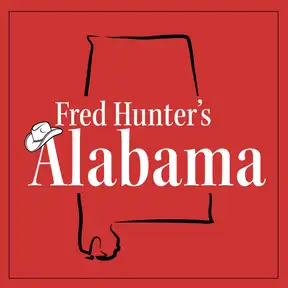Charles McNair: South Alabama Writer Lives High in the Andes
Writer Charles McNair Lives High in the Andes, but His Roots are in South Alabama
My conversation with Charles McNair felt a little like a family reunion as we connected many dots in our common roots. It was fascinating to learn how a boy from South Alabama wrote his way to being a Pulitzer-prize nominee, continues to write, and now resides a bit south of the Wiregrass in Bogota, Colombia.
Of course he found a very imaginative way to explain that his home state is always with him. Ask him if he’s from Alabama, and the proof is on his knee.
“At this very moment, if I weren’t modest, I’d pull up my left pant leg and show you my knee,” McNair said. “I might be the only person in the world with a banjo on my knee — because I come from Alabama. The day I turned 40, I walked down to the tattoo parlor near my home and got a little banjo tattoo.”
We had a great time talking about all the things we have in common, but when you’re interviewing a talented storyteller with an interesting past, it’s best to let them do the talking.
“Frasier-Ellis Hospital was a two-story house they called a hospital, and my mama delivered me in a room being observed by a team of medical students,” McNair said. “I’m told that when I was presented to the world, they all stood up and applauded. That may have been the defining moment that shaped my personality, I don’t know.”
That was 1954 in Dothan, and McNair would spend the next several years absorbing everything the natural world had to offer in the Wiregrass region of Alabama. “I was a large red woodland animal for my first, I’d say 16, 17 years,” he said. “I lived in those woods. We built forts. We had wars. We waded the creeks and watched out for snakes, ran from yellow jackets, and hid by the railroad track when the hobos came down the line. These were mythically terrifying figures. They were like Stephen King characters to us.
“And every night when I went to sleep all those years, I heard a train passing by on those tracks behind the house — that mournful whistle, the midnight train whining low,” he continued. “All that infused me with memories and things to write about. All my novels have been nature focused. The presence of the woods and nature played a tremendous role in all the books I've written.”
McNair has published three acclaimed novels: “Land O’ Goshen” (St. Martin’s Press, 1994), “Pickett’s Charge” (Livingston Press, 2013), and “The Epicureans” (Tune & Fairweather, 2024). He is also the author of “Play It Again, Sam: The Notable Life of Sam Massell, Atlanta’s First Minority Mayor” (Mercer University Press, 2017).
Growing up during the struggles and tensions of the Civil Rights era left a particular wound that McNair carried until a couple of years ago at a reunion of the Dothan High School class of 1972, the first integrated class at the school to graduate together.
“A dear friend, a Black man named Shaq Thompson, and I resolved to solve a problem that had existed since we’d graduated,” McNair explained. “In the 10th grade, they closed Carver, the Black school, and all of those students came over to Dothan. There had been a lingering resentment — the hurt feelings of having your culture and your history sort of ignored. Shaq and I brought back together the Black classmates and the white classmates for a 50th reunion. And I felt a healing.
“I also made peace with Dothan,” McNair added. “When I left at age 18, I could not wait to shake the dust off. It was too conservative. It was too constraining. And I went off to college and came back many years later and started to make my peace with Dothan and who I’d been and how it had been. My mother went into a decline around 2016, and I flew from Colombia every six weeks to stay a week with her. During that two-year period, I really started making peace with 50 years of anxiety and of disappointment in Dothan. I now am looking at a piece of property to buy there. I have come back. I’ve made new friends. The city’s different … I’m different.”
I’ve heard it said that no matter how far you go, you have to write about where you came from. McNair attests to that. The growing-up years are inescapable.
“I couldn’t agree more. It’s always about Alabama and family and those friends and that life for me,” he said. “That’s the core. That’s where everything else comes from.
McNair attended the University of Alabama for seven years and “when I left, I was still a sophomore,” he said. “I was in and out because of work and when I was in, I only took writing classes. I didn’t get credit for the writing classes that I repeated, but I still took them because that’s all I wanted to be, ever.”
The arc of McNair’s career is rich with experiences. He’s taught English to Saudi Arabian students. He’s worked in the newspaper business. He’s worked in corporate America, writing for BellSouth Corp. But he continued his personal writing all the while, publishing his first novel, “Land O’ Goshen,” when he was 40.
“If you drove by my house and saw the candle lit in the upstairs window, that was me working on a book,” he said. ‘I was a slow learner. It took me about 20 years to get my novel ready. The book is set around Dothan, and it exorcises lots of demons. There’s a lot of creative imagination in that.”
After his novel was nominated for a Pulitzer Prize, he moved to Atlanta with BellSouth. A few years later he set out as an independent contractor, writing a little bit of anything and everything, including magazine articles, speeches and scripts.
He recalled those early years of freelance and contract work. “The phone would ring, and they would say, ‘Can you?’ and I’d say, ‘Yep.’ And then I’d hang up and ask myself, ‘How can I do that?’ And I did it. My whole life is an act of improvisation. I don’t think I’ve ever planned any of this. It just happened.”
After 25 years in Atlanta, he had a second novel almost ready for publication when he moved to Colombia. That book was “Pickett’s Charge,” about the last Confederate soldier who, at 114 years old, finds out there is one Union soldier left alive in Maine.
“He gets off his cot in a Mobile nursing home and heads north to fight the last battle of the Civil War,” McNair said. “It’s really a discussion about when do you forgive? When does the vendetta end, and when do you move on from old wounds? How do you let it go?”
While the pandemic temporarily sidetracked his third novel, “The Epicureans,” last year he was able to launch the book in Atlanta and Dothan, garnering what he laughingly calls, “a little pop of glamour and false celebrity” that make the lonely work of writing worthwhile. “And then you get humbled all over again,” he said. The new book is about a family who faces forces of evil.
Talking about the memories of the Wiregrass and how his upbringing touches the subjects of his writing, the next question I had for McNair was obvious: How did you end up in Bogota? He provided a classic answer.
“How many times have you heard a story that started like this: Well, I met this girl…” McNair said with grin.
In an airport in 2013, he met Dr. Adela Castro, an eye surgeon. They recently celebrated an anniversary, and the admiration for his wife is obvious when he speaks of her.
“There’s a beautiful story that happened during COVID,” he said. “One of her patients couldn’t come in because of the virus, so her cataract thickened and got really hard. This lady lived by herself and had some chickens. She would go out and, by touch, find the eggs. This was her life.
“Adela performed surgery and removed her cataracts,” he continued. “When she came in for post-op, Adela asked how she was doing. The little lady looked at her and said, ‘I can see my chickens.’ You couldn’t say ‘2020 vision’ and tell a better story about the effect of that.”
Life in Bogota seems to suit McNair. “This city is bigger than Chicago. It is a very dense place and, like every city, it has its pluses and minuses,” he said. “We just try and breathe the air and be present, and love the moments we’re in. I'm blessed.”
McNair and I have another thing in common, and I saved my favorite subject for last: our love of baseball. He isn’t a mere fan — he was a semi pro player, and therefore an even bigger celebrity in my eyes.
“It’s not like it sounds, semi pro,” he explained. “I went to Italy in 1979, and I had enough money for two weeks. I was sitting at a cafe one evening and a man walked up to the table. He was about to make me a deal I couldn’t refuse. He asked if I was an American and whether I played baseball. Now, I had not had a glove on my hand in seven years. I had stopped playing at 18. I was 25 then. He said, ‘If you'll play for the local Italian baseball team, I'll give you a job and a free place to live through the season.’”
McNair’s response was a given. “I turned a two-week trip into a seven-month stay in Italy, traveling around Europe for two months after that,” he said. “Life changing. The Verona Arsenal needed a third baseman, and they were allowed to have one American on their team. Their 220-pound slugger had left the year before, and they drafted me. Man, I had the best time you ever saw.”
Like two old boys from Alabama, McNair and I spent our remaining moments together comparing our favorite teams and looking back to the local TV stations that carried the games. It felt like we were kicking a can down the road as he talked about listening to Hank Aaron’s games on his Magnavox transistor radio. We confirmed we’re both Atlanta Braves fans, and agreed that if we put an all-star team together from any era, you couldn’t beat a lineup of native Alabamians.
Talking with McNair was a special moment for me — a real feeling of connection. I’ll hold him to his promise to look me up and talk more baseball next time he travels north.
Creators and Guests

Editor
Lucas Smith
Lucas Smith engineers a number of podcasts across the country. A graduate of Dark Horse Institute, he's the proprietor of Lucky Sound Studio, located in historic downtown Fort Payne, Alabama.

